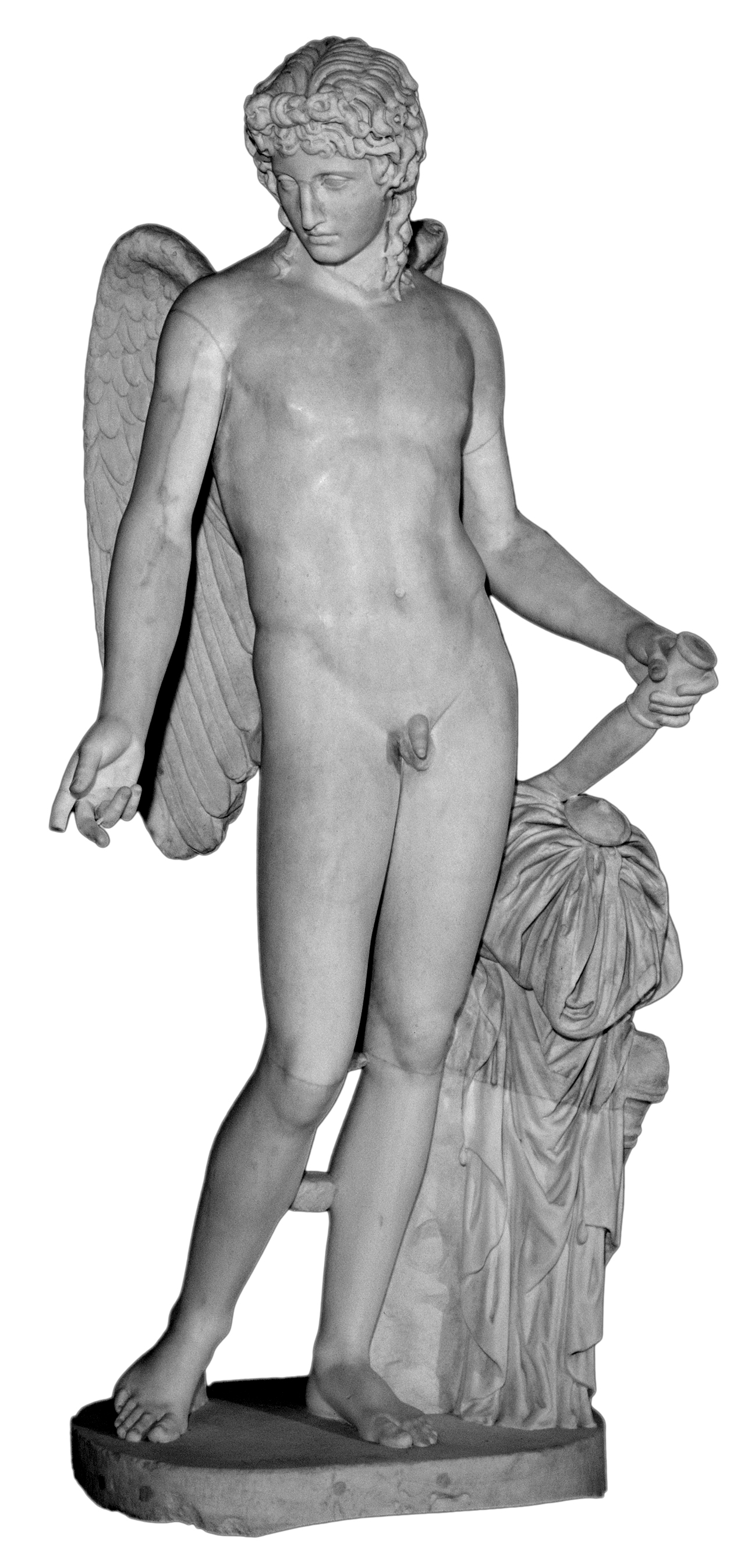- Eros
Infobox Greek deity

Caption = Eros
1st c. BCE marble fromPompeii . This statue is also known as Eros Centocelle, and is thought to be a copy of the colossal Eros of Thespiae, a work by Praxiteles. [A. Corso, "Concerning the catalogue of Praxiteles’ exhibition held in the Louvre." Conference paper presented at ИНДОЕВРОПЕЙСКОЕ ЯЗЫКОЗНАНИЕ И КЛАССИЧЕСКАЯ ФИЛОЛОГИЯ – XI June 2007; p.159]
Name = Eros
God_of = Primordial god of lust, love and intercourse
Abode =
Symbol =
Consort =
Parents =Ares andAphrodite
Siblings=
Children=
Mount =
Roman_equivalent =Cupid Eros ( _el. Ἔρως), in
Greek mythology , was the primordial god of lust,love , andintercourse ; he was also worshipped as a fertility deity. His Roman counterpart wasCupid . In some myths, he was the son of the deitiesAphrodite andAres , but according to Plato's Symposium he was conceived by Poros (Plenty) and Penia (Poverty) at Aphrodite's birthday. This explains the different aspects of love. ---LikeDionysus , he was sometimes referred to asthe sexual beast , "the liberator". His Roman equivalent wasCupid , "desire", also known as Amor, "love".According to tradition which was made by Eratosthenes, Eros was principally the patron of male love, while Aphrodite ruled the love between men and women. His statue could be found in the palaestrae or wrestling schools, one of the principal venues for men to associate with their beloveds, and it was to him that the Spartans sacrificed before battle. Meleager records this role in a poem preserved in the Greek Anthology: "a woman, hurls the fire that maddens men for women; but Eros himself sways the passion for males." (Mousa Paidiké, 86)Throughout Greek thought, there appear to be two sides to the conception of Eros; in the first, he is a primeval deity who embodies not only the force of erotic love but also the creative urge of ever-flowing nature, the firstborn Light for the coming into being and ordering of all things in the cosmos. In Hesiod'sTheogony , the most famous Greekcreation myth , Eros sprang forth from the primordial Chaos together with Gaia, the Earth, andTartarus , theunderworld ; according toAristophanes ' play "The Birds", he burgeons forth from an egg laid by Night conceived with Darkness. In theEleusinian Mysteries , he was worshiped as "Protogonus ', the first-born.Alternately, later in antiquity, Eros was the son of
Aphrodite and eitherAres (most commonly),Hermes orHephaestus , or of Porus andPenia , or sometimes of Iris andZephyrus ; this Eros was an attendant to Aphrodite, harnessing the primordial force of love and directing it into mortals.Worship of Eros was uncommon in early Greece, but eventually became widespread. He was fervently worshiped by a fertility cult inThespiae , and played an important role in theEleusinian Mysteries . In Athens, he shared a very popular cult with Aphrodite, and the fourth day of every month was sacred to him.Eros, very angry at the lovely
Apollo for making fun of hisarchery skills, caused him to fall in love with thenymph Daphne , daughter ofLadon , who had scorned him. Daphne prayed to her father, the river godPeneus to help her escape Apollo and was changed into a laurel tree, which became sacred to Apollo.The story of
Eros and Psyche has a longstanding tradition as a folktale of the ancient Greco-Roman world long before it was put to print; first seen inApuleius 'Latin novel, "The Golden Ass ", this is apparent and an interesting intermingling of character roles. The novel itself is picaresque Roman style, yet Psyche and Aphrodite retain their Greek parts. It is only Eros whose role hails from his part in the Roman pantheon.The story is told as a digression and structural parallel to the main storyline of Apuleius' novel. It tells of the struggle for love and trust between Eros and Psyche, whose name is difficult to appropriately translate as it transcends both the Greek and Latin language, but can be taken to mean "soul", "mind" or rather both. Aphrodite is jealous of the beauty of mortal Psyche, as men are leaving her altars barren to worship a mere human woman instead, and so commands her son Eros to cause Psyche to fall in love with the ugliest creature on earth. Eros falls in love with Psyche himself and spirits her away to his home. Their fragile peace is ruined by a visit of Psyche's jealous sisters, who cause Psyche to betray the trust of her husband. Wounded, Eros departs from his wife and Psyche wanders the earth, looking for her lost love.
In Apuleius's The Golden Ass Psyche bears Eros a daughter,
Hedone , whose name means "pleasure." This story is fictional therefore Hedone is fictional.Notes
reflist
References
* Bartsch, Shadi and Thomas Bartscherer, eds. "Erotikon: Essays on Eros, Ancient and Modern". Chicago: University of Chicago Press, 2005.
* Bataille, George Translated "The Tears of Eros". Translated by Peter Connor. San Francisco: City Lights Books, 1989.
* Calame, Claude. "The Poetics of Eros in Ancient Greece". Translated by Janet Lloyd. Princeton: Princeton University Press, 1999.
* Carson, Anne. "Eros the Bittersweet: An Essay". Princeton, N.J.: Princeton University Press, 1986.
* Nygren, Anders. "Agap New York: and Eros". by Philip S. Watson.Harper and Row, 1969.
*Amatorius, 756 E-F: Plutarch's Citation of Parmenides and Hesiod Hubert Martin, Jr. The American Journal of Philology, Vol. 90, No. 2. (Apr., 1969), pp. 183-200.ee also
*
Anteros
*Himerus
*Greek words for love
*Eros (love)
*Love at first sight
*Cupid
* Kama
*Psyche
*Rene
Wikimedia Foundation. 2010.
